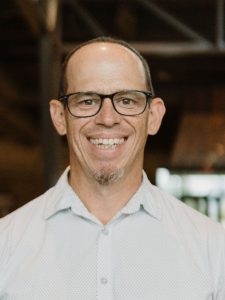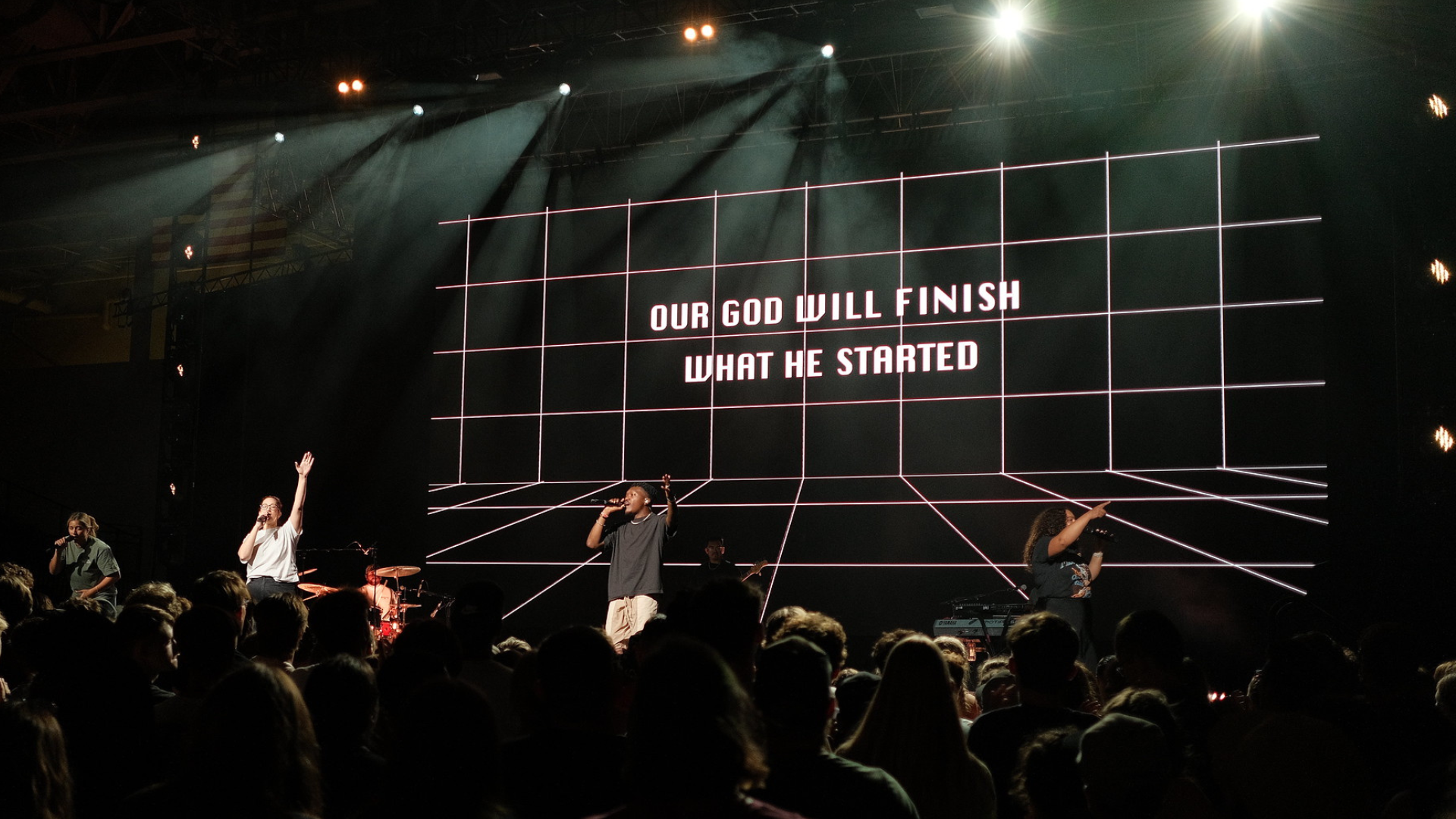Last month, Pete Sutton joined the Serve Locally team as the director of youth and young adults. He is new to the Evangelical Covenant Church and brings decades of ministry experience, a heart for equipping leaders, and a vision for helping young people not only fall in love with Jesus but also stay rooted in the church for a lifetime. The Covenant Companion sat down with Pete to hear his story and what excites him about this new season.
Can you tell us about your path into youth ministry?
I grew up baptized Catholic, but then my parents walked away from faith altogether. For the first few years of my life, church wasn’t part of the picture. That started to change when I was about five, when some neighbors invited us kids to church. My parents had no interest in going, but the neighbors asked, “Can we take your kids to vacation Bible school? They’ll be out of your hair for about four hours a day for the whole week.”

I’ve got a twin sister and a younger brother, and my mom jumped at the opportunity for a week of quiet. We went, had a blast, and came home talking about Jesus nonstop. My mom was like, What kind of place did I just send my kids to? It didn’t match her idea of church at all. So she went to check it out herself, fell in love with the people, and ended up giving her life to Christ. She still worships in that church today.
That little Baptist church in the far western suburbs of Chicago became a formative place for me. I grew up surrounded by men and women who modeled faith, marriage, family, and discipleship. They showed me what it meant to be a husband, a father, a follower of Christ.
When I got into high school, I connected with a great group of friends from a different church in the area. Their youth ministry drew me in, and that’s where God started poking me about a possible calling. People kept saying, “Hey, you’d be a great youth pastor.” At the time, I had delusions of playing professional soccer or maybe being an artist, but the truth was, I wasn’t great at either of those things. What stuck with me was the fact that others recognized something in me—that I might be good at youth ministry.
So I took the leap. I enrolled at Cedarville College, a small Christian college in Ohio, majored in biblical studies with an emphasis in Christian education, and absolutely loved it. When I graduated, I couldn’t wait to dive into ministry. I was ready to build a big, effective youth ministry. The only problem was that nobody wanted to hire me. I sent out close to 30 résumés and didn’t get a single response. I was discouraged, but finally I sent out one last résumé to a church I found online. This was the mid-1990s, so the idea of finding a ministry job on the internet felt wild. But they called me back.
That church was Methodist, which gave me pause because I’d grown up Baptist. I wondered, Can I even minister in a Methodist context? But they offered me the job, and I needed a job. Plus, it was in Florida, which sounded like an adventure. So I took it. My professors at my Baptist college were convinced I was either going apostate or heading into the mission field.
I learned so much in that church. It opened my eyes to a different style of ministry and broadened my perspective on what the church can look like. My wife and I got married during that season, and we loved life and ministry in south Florida.
So Baptist, then Methodist in Florida. What next?
Eventually, we started having kids, and that shifted our priorities. We wanted to be closer to family. Both of us were from the Chicago area, but we didn’t want to live so close that our parents could drop in unannounced. We settled in Cincinnati and joined a small church plant. We spent five years there, watching it grow tremendously and building a lot of strong relationships.
But then came a really hard season. Both my father and my wife’s father died within nine months of each other. It was devastating. We felt like we needed to get back home to be close to our moms, to help care for them, and to give our kids the chance to know their grandmothers. So we returned to the church where my wife and I had first met in high school.
That was a multisite, nondenominational church. I started out leading junior high ministry, and over time I became director of ministry across all four campuses. It was an incredible opportunity. I learned the dynamics of multisite ministry, gained leadership experience, and had some fantastic mentors and supervisors who poured into me. We stayed there for 11 years, and honestly, I thought I’d spend the rest of my career there.
But then the leadership shifted. New leaders came in with very different ideas about youth ministry. It became clear that it was time for us to move on. We found a role in an Evangelical Free Church in the Chicago suburbs, and I spent the next seven years there.
Those years were eye-opening. I came to realize that I really needed to be part of a denomination. Nondenominational ministry has its place, but I found myself longing for a broader theological foundation, a sense of rootedness, and the support of a larger tribe.
And then came 2020. COVID hit, political polarization deepened, Christian nationalism rose to the surface, and the evangelical movement was changing rapidly. I wrestled with my own theology in that season. I realized I didn’t fit well anymore in the large-church, growth-model, untethered kind of ministry. I didn’t want to just build numbers. I wanted relational depth, I wanted to equip adults to disciple students, and I wanted longevity.
That became my mantra: I want to develop young people who fall in love with Jesus and the church for a lifetime.
How did you come to that conclusion? Was there one moment where it clicked for you?
I can’t point to one dramatic moment, but I can describe the season when it clicked. I began to notice two patterns in my students.
On one hand, I had students who finished our program and felt called into ministry. They became youth pastors, and we have dozens of those stories across the country. I love that.
But on the other hand, I had far more students whose story went like this: “Youth group was awesome. I loved Jesus. That was a great season of my life…but now I don’t really have a church home.” Years later, those same students would call me in crisis. They’d say, “Pete, you’re the only pastor I know. Can you walk me through my divorce? Can you pray for me as I deal with addiction? Can you help me while I’m unemployed?”
It broke my heart. I realized that while they’d had a flourishing faith as teenagers, it wasn’t rooted deeply enough to last. It reminded me of the parable of the sower—seeds that sprang up quickly but didn’t endure because the soil wasn’t ready. That’s when I knew I needed to shift my focus. I had to help students develop habits and relationships that would tether them to Jesus and his church long after they left the youth group.
And here’s the thing—when I look back, there are some adults I trained 15 years ago who are still faithfully serving in youth ministry at their churches. There’s a group that every year hosts a reunion party, and 30 young women who were once in a small group still come back together. That’s the kind of generational connection I want to cultivate.
You’ve said that the 1990s were kind of a “black hole” for youth ministry. What do you mean by that?
The ’90s were wild. Everything grew. Youth ministries exploded in size. Why? Because churches were investing in young people, technology was becoming affordable, and culturally, we had this moment where families were busy, parents were both working, and kids needed something to do. So youth ministry was the answer. In the 1990s, if your youth group wasn’t growing, something was wrong. You had to actively try not to grow. Screens, sound systems, lights—it was all accessible. It was a golden era.
But then came 2010. Smartphones and social media changed everything. Suddenly, every kid had more technology in their pocket than I could ever put in a youth room. At the same time, research like Unchristian and You Lost Me made clear that young people were leaving the church in droves. The model that had worked in the ’90s was not sustaining faith.
That’s why I call it the “black hole.” We thought we were killing it—big numbers, big events, huge youth rooms—but when those kids became adults, so many didn’t stick around. We need to learn from that. Today’s students are different. Gen Alpha is the first majority non-white generation. They are deeply aware of issues like race, gender equality, and mental health. They’re carrying more information and anxiety than any generation before them. We need a more robust, holistic model of youth ministry to meet them where they are.
How did the Covenant enter the picture for you personally?
Joel Willitts is a good friend of mine who teaches at North Park University. He kept telling me, “You’re Covenant.” At the time, I didn’t know what that meant. In 2018, he invited me to teach in the youth ministry department at North Park, and I got to finish out the major for several students. I loved it. The conversations, the theology, the students—it was all life-giving.
That was my only direct experience with the Covenant until recently. But when I started sensing it was time for a new chapter, I knew I didn’t want to resurrect someone else’s old model of youth ministry. I didn’t want to chase church growth metrics. I wanted to be tied to a denomination with roots and history. All the signs kept pointing back to the Covenant.
When I saw the job description for this role pop up, I showed it to my wife. She said, “If you wrote a job description for yourself, could you write a better one than this?” She was right. A friend of mine even joked, “If you don’t apply, I’ll unfriend you.” So I applied.
As the process unfolded, God kept affirming it. A colleague in Naperville pulled me aside with the same job posting and said, “You need to apply for this.” I giggled, because I already had. The timing was also a blessing—it gave me space to finish well in my church, graduate a class of students, and leave with integrity. When the Covenant extended the call, I couldn’t have been more thrilled.
We talk a lot about balancing the heritage of the Covenant with an openness to what it’s becoming. As someone new to the Covenant, how do you anticipate maintaining that balance?
It’s a challenge, honestly. I don’t know all the acronyms or the full history, so sometimes I don’t even know what I don’t know. But there’s a gift in that too. I don’t come in with baggage or preconceived loyalties. I get to be a blank slate, with ears open, eyes open, and a posture of learning.
I do know that the Covenant has a rich tradition in youth ministry. In the 1990s, North Park was the epicenter of innovative youth ministry, especially urban ministry. Events like CHIC, now Unite, are legendary. Those things need to be honored.
But we also need to keep asking how to package the same gospel in ways that make sense for a new generation. Jesus talked about old and new wineskins. The wine is still good—we just may need new skins. That’s how I see my role: discerning what to cherish, what to reshape, and how to honor the past while making space for the future.
If people could only know one thing about you, what would it be?
I’ll cheat and give you two things.
First, I’m a people person. On the Enneagram, I’m a Two. I love shepherding, encouraging, and equipping others. My hope in this role is to be a cheerleader, a prayer warrior, and a supporter of the incredibly gifted youth leaders we have all over the Covenant. I want to shepherd our shepherds.
Second, I want to cast a vision for the future. I dream of building a strong pipeline that takes kids from early childhood into adulthood with a sense of calling. Not just to vocational ministry, but to medicine, education, the arts, business, technology—you name it. I want students to know that God made them wonderfully, and that there is a hole in the world only they can fill for the glory of his kingdom.
That means building stronger connections with North Park University and Seminary, connecting students with Covenant partners and programs, and helping them discover their place in God’s story. My prayer is that when students leave our young adult ministries, they’ll carry a strong sense of identity, belonging, and purpose in Christ.
That’s the vision that excites me most about this role—helping young people not just meet Jesus, but fall in love with him and his church for a lifetime.














